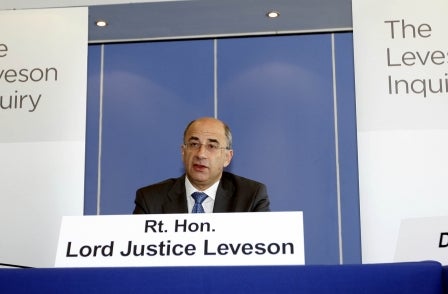
The Guardian’s director of editorial legal services Gill Phillips has said the outcome of Leveson Inquiry has been “disastrous”.
Speaking at the Protecting the Media conference in the City of London, Phillips said the wrangling over press regulation following last year’s inquiry and subsequent report has left all sides dissatisfied.
She added that the detention of David Miranda, the partner of Guardian journalist Glenn Greenwald who revealed details of a vast network of US and UK surveillance operations on the back of leaks from whistleblower Edward Snowden, showed why the state must not be allowed to regulate the press.
Phillips told delegates: “What Leveson has come up with is the worst of all worlds.
“His attempt to please everybody and avoid being a dusty footnote on a shelf somewhere has led him down a road that has proved to be pretty disastrous.
“We don’t have anything that could be perceived as effective or credible by either side of the debate.”
She also said that the use of Royal Charters – two rival versions of which have been submitted to the Queen’s Privy Council by politicians and the newspaper industry – was “medieval”.
The Privy Council, a body made up of Government ministers, is currently examining the industry charter, with the version agreed by the three main political parties due to be considered later in the autumn if the former is not ratified.
Phillips dismissed the use of the arcane body as a “medieval” tool that had been “used by monarchs to circumvent parliament”.
Phillips was particularly concerned by the provision in the parliament-backed Royal Charter for the establishment of a free arbitration service to decide damages claims against publishers.
Echoing concerns previously expressed by many local and regional news groups, she said: “We are creating a charter for people with dodgy claims. People will be tempted to go and try and get some money.”
Phillips also said the danger of state intervention in the press had been highlighted by Miranda’s detention at Heathrow Airport for nine hours under the Terrorism Act.
“If anything demonstrates why we do not want a government regulating the press, David Miranda is that,” she told the conference. “We live in a democratic state and they still did what they did to David Miranda for no good reason at all. It goes back to the whole debate about why we shouldn’t have the state regulating the press.”
Meanwhile, the newspaper and magazine industry is currently pressing on with the creation the Independent Press Standards Organisation – a new press regulator which follows the template set out in the Royal Charter submitted by publishers' body Pressbof to the Privy Council.
If the ministers ultimately reject the Pressbof charter and instead support the one put forward by politicians the new press regulator could be left without official recognition. This would leave publishers open to threat of exemplary damages in libel actions, as set out in Crime and Courts Act 2013.
Email pged@pressgazette.co.uk to point out mistakes, provide story tips or send in a letter for publication on our "Letters Page" blog
